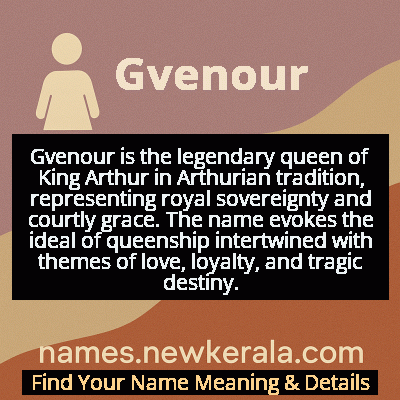Gvenour Name Meaning & Details
Origin, Popularity, Numerology Analysis & Name Meaning of Gvenour
Discover the origin, meaning, and cultural significance of the name GVENOUR. Delve into its historical roots and explore the lasting impact it has had on communities and traditions.
Name
Gvenour
Gender
Female
Origin
Arthurian
Lucky Number
3
Meaning of the Name - Gvenour
Gvenour is the legendary queen of King Arthur in Arthurian tradition, representing royal sovereignty and courtly grace. The name evokes the ideal of queenship intertwined with themes of love, loyalty, and tragic destiny.
Gvenour - Complete Numerology Analysis
Your Numerology Number
Based on Pythagorean Numerology System
Ruling Planet
Jupiter
Positive Nature
Optimistic, inspirational, and creative.
Negative Traits
Scattered, exaggerating.
Lucky Colours
Yellow, gold, purple.
Lucky Days
Thursday.
Lucky Stones
Yellow sapphire.
Harmony Numbers
1, 2, 9.
Best Suited Professions
Arts, writing, communication.
What People Like About You
Creativity, optimism.
Famous People Named Gvenour
Gwenhwyfar (Gvenour)
Legendary Queen
Queen consort of King Arthur and central figure in Camelot's court
Gwenhwyfar ferch Ogrfan
Mythological Queen
Symbol of courtly love and chivalric ideals in medieval literature
Queen Gvenour
Literary Character
Inspiration for numerous Arthurian romances and courtly love traditions
Name Variations & International Equivalents
Click on blue names to explore their detailed meanings. Gray names with will be available soon.
Cultural & Historical Significance
Throughout medieval literature, Gvenour served as a mirror reflecting changing attitudes toward women, marriage, and courtly behavior. In earlier versions, she might be kidnapped and require rescue, while later traditions emphasize her agency and the tragic consequences of her choices. Her story has been interpreted through various cultural lenses—as a Celtic sovereignty goddess figure, a Christian exemplar of flawed humanity, and a romantic heroine whose personal desires conflict with public duty. This multifaceted portrayal makes her one of Western literature's most enduring and adaptable female characters.
Extended Personality Analysis
Gvenour is typically characterized by a complex blend of royal dignity, emotional depth, and personal conflict. As Arthur's queen, she exhibits grace under pressure, diplomatic skill, and a strong sense of her royal responsibilities. She moves through court with elegance and authority, commanding respect while maintaining the feminine ideals expected of a medieval queen. However, beneath this composed exterior lies a passionate nature capable of profound love and devastating choices.
Her personality embodies the tension between duty and desire that defines much of Arthurian tragedy. While loyal to Arthur in her role as queen, her romantic involvement with Lancelot reveals a capacity for deep emotional connection and personal fulfillment outside political arrangements. This duality makes her both admirable and flawed—a woman torn between her heart's calling and her crown's demands. Modern interpretations often emphasize her intelligence, strength, and the limited choices available to even the most powerful women in patriarchal societies, making her a symbol of feminine agency constrained by circumstance.
Modern Usage & Popularity
The name Gvenour and its variations remain primarily literary and historical rather than common given names in contemporary usage. While Guinevere has seen occasional use, particularly among parents drawn to Arthurian names, Gvenour itself is extremely rare in modern naming practices. It appears most frequently in academic discussions of Arthurian literature, fantasy genre works, and historical fiction. The name's usage trends reflect a niche appreciation for Celtic and Arthurian traditions rather than mainstream popularity. In recent years, there has been slight increased interest in medieval names, but Gvenour remains firmly in the category of distinctive, historically significant names chosen by parents seeking unique literary connections rather than following naming trends.
Symbolic & Spiritual Meanings
Gvenour symbolizes the eternal conflict between love and duty, personal desire and public responsibility. As Arthur's queen, she represents sovereignty and the feminine principle in kingship—the idea that a ruler's legitimacy is enhanced by his union with the right queen. Her story serves as a metaphor for the fragility of ideal societies and how personal failings can have catastrophic public consequences. The name evokes themes of beauty that inspires both creation and destruction, loyalty tested by passion, and the price of idealized love in a imperfect world.
In broader symbolic terms, Gvenour embodies the concept of the 'sovereignty goddess' from Celtic tradition—the land itself personified as a woman whose favor grants kingship. Her relationships with Arthur and Lancelot represent different aspects of rule: stability and order versus passion and individual excellence. This makes her not just a character but a symbolic representation of the tensions within any society between tradition and innovation, law and love, collective good and personal fulfillment.

